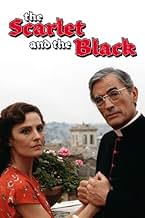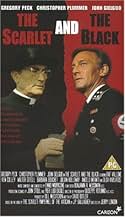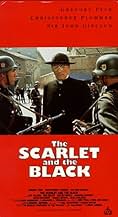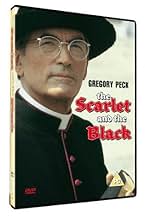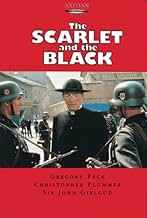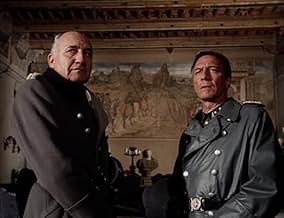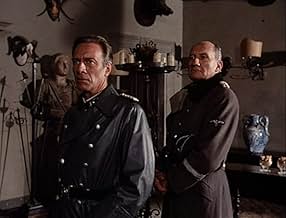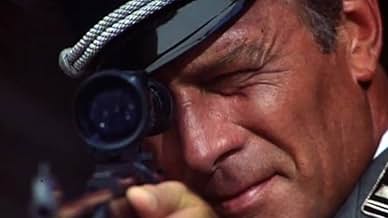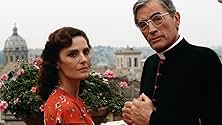Vatican efforts, led by Monsignor Hugh O'Flaherty, to save Allied P.O.W.s and downed Allied airmen as the Nazis invade Rome.Vatican efforts, led by Monsignor Hugh O'Flaherty, to save Allied P.O.W.s and downed Allied airmen as the Nazis invade Rome.Vatican efforts, led by Monsignor Hugh O'Flaherty, to save Allied P.O.W.s and downed Allied airmen as the Nazis invade Rome.
- Director
- Writers
- Stars
- Won 1 Primetime Emmy
- 1 win & 2 nominations total
- Pope Pius XII
- (as Sir John Gielgud)
- Capt. Hirsch
- (as Ken Colley)
- Director
- Writers
- All cast & crew
- Production, box office & more at IMDbPro
Featured reviews
Although Monsignor Hugh O'Flaherty, an Irish national attached to the Vatican staff, was providing aid to refugees of all kinds from the Nazis before, this film covers a period between September of 1943 and June 5, 1944 when Mark Clark and the Fifth American Army liberated Rome.
Gregory Peck plays the resourceful monsignor who's got a whole bag of tricks from the land of leprechauns to outwit the Nazis. He develops quite a network of people who house escaped prisoners. When Italy threw out Mussolini and switched sides in World War II, a whole lot of Allied prisoners were freed and roaming the countryside. You might remember the novel and film Von Ryan's Express which detailed that phenomenon. The word got out if you could make your way to the Vatican, Monsignor O'Flaherty could help.
What I like about The Scarlet and the Black is the fact that Peck's chief antagonist Christopher Plummer is shown as a three dimensional character. We see him as the ruthless Nazi who dogs Peck and his operation every step of the way. We also see him as father and husband who's enjoying Christmas in Rome with his family and also acting like any other tourist taking the family to see the sights of the Eternal City.
Peck and Plummer are a pair of well matched antagonists. Presiding over it all is John Gielgud as Pius XII. The criticisms I have of Pius occur before he reached the Papacy in 1939. At the point in time that The Scarlet and Black is taking place, there was very little he or anyone else as Pope could have done. He feared, probably with good reason, an Avignon captivity situation for the Papacy if he appeared to be overtly pro-Ally. And of course the Soviet Union which was his big fear was an Ally.
I would recommend watching this film about a good man who happened to be a priest who stepped up to the plate when no one would and fulfilled a great need. A whole lot of lives were saved because of him.
This is the true story of a man whose conscience will not let him stand by while the world goes to hell around him. Gregory Peck plays an O'Flaherty whose quaint 'Oirish' charm hides a cunning and resourceful leader who has to balance the demands of his conscience with his role as an official in the Vatican government.
Pope Pius makes it clear he understands O'Flaherty's motivation while warning him that if he is arrested, the Pope will not compromise Vatican neutrality to save him. The film does its best to restore Pius XII's reputation - he has been called "Hitler's Pope" - but it is unclear how much he knew of, or even condoned, O'Flaherty's activities. O'Flaherty cannot compromise, and continues with his work despite the Gestapo having orders to shoot him on sight if he is found outside the Vatican, and suffering a failed assassination attempt in St Peter's itself.
Christopher Plummer is always worth watching and his performance here is no exception. Shown first as an arrogant man who feels the Nazis now "own Rome... it's ours", we later see that Kappler is at the mercy of this ruthless regime even as he plays his part in it. Finally the only person he can turn to is his arch-enemy from the Vatican. This is a fairly conventional irony, but during the course of the film Plummer also suggests how Kappler is losing his soul to his inhuman work, becoming isolated from his family as he begins to loathe what he is doing. You feel Kappler hates O'Flaherty not simply because of what he does, but because O'Flaherty represents the better part of himself.
I would give the film more stars but it is about 15 minutes too long and becomes rather episodic towards the end. However, it's a great story, well-acted by a strong cast, and can be viewed and enjoyed many times.
The book is entitled "The Scarlet Pimpernel of the Vatican," by J. P. Gallagher. It is the story of Irish Monsignor Hugh O'Flaherty who was a minor Vatican official during World War II. Right under the noses of Vatican officials who looked the other way, and the German army, he helped smuggle allied soldiers out of Rome to safety in the months before the liberation of Rome. Rome and the Vatican were supposed to be neutral; if the Germans found out that the monsignor was helping the allies, who knows what would have happened.
I was able to find a copy of the book several years ago but have lost it. I do recall though that it had even more incredible stories about how O'Flaherty helped allied soldiers. One of the best (that is not in the movie) was about one American soldier whose appendix burst and he needed it removed. O'Flaherty dressed him as a German soldier, called the German army, they came and took him to their hospital - and O'Flaherty managed to get the soldier out before he even woke up because of the general confusion in the military hospital.
The Scarlett Pimpernel reference, is of course, to the British spy who helped save people from being beheaded during the French Revolution. That's another good book and the movie, with Anthony Andrews and Jane Seymour, are both excellent (though the movie changed the ending...).
This story is inspired on actual facts and based on the nonfiction novel titled ¨The Scarlet Pimpernel of the Vatican¨ by J.P.Gallaher. This interesting story drags in some place but is well realized and contains good cinematography by Giuseppe Rotunno and excellent musical score by Ennio Morricone. It's a lavish production by Bill McCutchen , an ITC-RAI Radiotelevisione Italiana Co-production for world distribution, well filmed by Jerry London entirely on location in Rome.
The real events are the following : In the early years of World War II, O'Flaherty (Gregory Peck)toured prisoner of war camps in Italy and tried to find out about prisoners who had been reported missing in action.When Italy changed sides in 1943, thousands of British POWs were released. Some of them (John Terry), remembering visits by O'Flaherty , reached Rome and asked him for help. O'Flaherty did not wait for permission from his superiors. He recruited the help of other priests (Raf Vallone, Angelo Infanti), and a Swiss count (Vernon Dobtcheff). He also kept contact with Sir D'Arcy Osborne (Peter Burton), British Ambassador to the Vatican. O'Flaherty and his allies concealed 4,000 escapees − Allied soldiers and Jews − in flats, farms and convents. One of the hideouts was beside the local SS headquarters. O'Flaherty coordinated all this and when he was visiting outside the Vatican, he wore various disguises.The German occupiers of Rome commanded by Col. Herbert Kappler (Christopher Plummer) under orders of Reichsfuhrer Heinrich Himmler (T. P. McKenna) tried to stop him and eventually they found out that the leader of the network was a priest.His efforts put him at odds with the Pope Pius XII (John Gielgud) and SS attempts to assassinate him failed. They found out his identity, but could not arrest him inside the Vatican. When the German ambassador revealed this to O'Flaherty, he began to meet his contacts on the stairs of the St. Peter's Basilica.Several others, including priests, nuns and lay people, worked in secret with Msgr. O'Flaherty, and even hid refugees in their own private homes around Rome. Another person who contributed significantly to this operation was the Malta-born widow Chetta Chevalier (Olga Karlatos), who hid some refugees in her house with her sons (Fabiana Udenio), and was lucky to escape detection. When the Allies arrived in Rome in June 1944, 3,925 of the escapees were still alive. O'Flaherty demanded that German prisoners be treated properly as well. He took a plane to South Africa to meet Italian POWs and to Jerusalem to visit Jewish refugees. Of the 9,700 Jews in Rome, 1,007 had been shipped to Auschwitz. The rest were hidden, 5,000 of them by the official Church − 3,000 in Castel Gandolfo, 200 or 400 as "members" of the Palatine Guard and some 1,500 in monasteries, convents and colleges. The remaining 3,700 were hidden in private homes. After liberation Monsignor O'Flaherty was honored by Italy, Canada and Australia given the US medal of Freedom and made a Commander of the British Empire. Herbert Kappler was sentenced to life imprisonment for war crimes. In the long years that followed in his Italian prison, Kappler had only one visitor. Every month, year in and year out, O'Flaherty came to see him. In 1959, the former head of the dreaded Gestapo in Rome was baptized into the Catholic faith at the hand of the Irish priest.
Did you know
- TriviaWhile serving his sentence in prison, Herbert Kappler divorced his first wife and married his nurse, Anneliese, in 1972. In 1975, he was diagnosed with cancer. As the authorities refused to release him, in 1977, Anneliese carried Kappler out of prison in a large suitcase (he weighed less than one hundred five pounds at the time). They escaped to West Germany, where Kappler died six months later.
- GoofsIn at least four scenes, Herbert Kappler wears a black SS parade tunic instead of his usual office gray uniform. By 1943, when the film is set, the SS had completely phased the black SS tunic out of service and this uniform would not have been worn at even the most formal of functions.
- Quotes
Col. Herbert Kappler: You're alone?
Monsignor Hugh O'Flaherty: I am.
Col. Herbert Kappler: Not afraid I'll shoot you?
Monsignor Hugh O'Flaherty: No. If you were going to kill me, your man would have already done it in my room.
Col. Herbert Kappler: That is so.
[pause]
Col. Herbert Kappler: But believe me, at this moment, nothing would give me greater pleasure.
Monsignor Hugh O'Flaherty: Well, when it comes down to it, a bullet's your answer to just about everything, isn't it? The only argument you've got.
- Alternate versionsAn edited version of approximately 110 minutes (120 minutes when broadcast with adverts) is sometimes shown on TV in the UK.
- ConnectionsReferences Représailles (1973)
- SoundtracksLa Boheme
Composed by Giacomo Puccini

